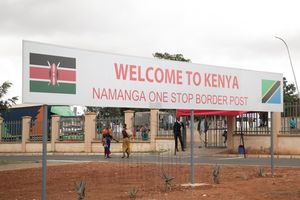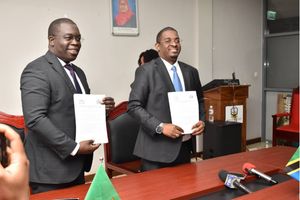US blow over escrow

US ambassador Mark Childress
What you need to know:
In a press statement, Mr Childress said the MCC Board meeting on Wednesday in Washington shelved the facility as it awaits the outcome of the escrow investigation and other reforms to tame corruption, mainly in the energy sector.
Dar es Salaam. The United States has just hit Tanzania with a major financial blow again, this time citing runaway corruption. Ambassador Mark Childress announced yesterday that the Americans had put on hold the signing of the Millennium Challenge Corporation (MCC) compact with Tanzania pending the government’s action on the Tegeta escrow scandal.
In a press statement, Mr Childress said the MCC Board meeting on Wednesday in Washington shelved the facility as it awaits the outcome of the escrow investigation and other reforms to tame corruption, mainly in the energy sector.
The move comes at a time the government is struggling to fund the 2014/2015 budget after 12 donor countries and multilateral bodies, including the World Bank, withdrew $558 million (nearly Sh1 trillion) in aid over the same scandal.
The General Budget Support funding was withheld in May this year and the State’s efforts to appease the donors have hit a brick wall. Like the US, the donors want to see those implicated taken to task before they make any funding commitments. Yesterday, the US ambassador said the MCC funds expected to be released in early 2015 would not be forthcoming.
This development comes despite the fact that the US Congress approved an allocation of $9.78 million (Sh16.14 billion) in October to help Tanzania lay the groundwork for the second MCC funding that was reportedly in the range of $450 million to $700 million.
In the past five years, the government relied on $698 million funding from MCC to roll out extensive electricity, power and water projects across the country. The government intended to use the second phase of the MCC funds to extend similar services to more rural areas and open up the rich southern agricultural corridor.
News of the MCC move spread quickly yesterday, receiving substantial traction on social media as Tanzanians poured out their frustrations. It also vindicated Kigoma South MP David Kafulila who, during the heated debate on the IPTL scandal last month, told Parliament that the MCC had shelved funding over corruption. The minister for finance then denied the MP’s claim.
Mr Kafulila first raised the Tegeta escrow matter in Parliament after The Citizen exclusively reported the matter. In its Wednesday statement, the MCC Board said it was concerned about the country’s corruption record but added that it was pleased with President Kikwete’s promise that he would crack the whip.
“Progress in combating corruption is essential to a new MCC compact, as well to an overall improved business climate in Tanzania,” Mr Childress said. “We are encouraged by the State House’s announcement of December 9 that it will soon address the parliamentary resolutions linked to IPTL, and we urge quick government action, given the impact on several key development issues.”
Although the board voted to allow Tanzania to continue working on the compact proposal--given its position on the MCC’s policy scorecards and its strong previous performance as an MCC partner--it stated, however, that a final MCC compact would be approved only if the government took concrete steps to combat corruption.
MCC is a United States Government agency that provides assistance to developing countries. If the compact were to be finalised, Tanzanians would benefit from multi-billion shilling projects that the agency funds in the country and it would be Tanzania’s second MCC compact.
But because MCC is based on the principle that the aid it offers is most effective when it reinforces good governance, there were fears that the US could cancel the MCC funding over corruption concerns.
During its annual country selection meeting, the board noted that Tanzania has experienced a significant decline over the past seven years on the key indicator measuring efforts to control corruption.
The board also reaffirmed more broadly that Tanzania must undertake a series of previously agreed upon structural reforms to improve the efficiency, effectiveness and transparency of the energy sector.




